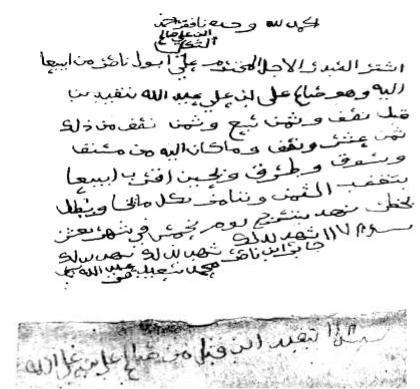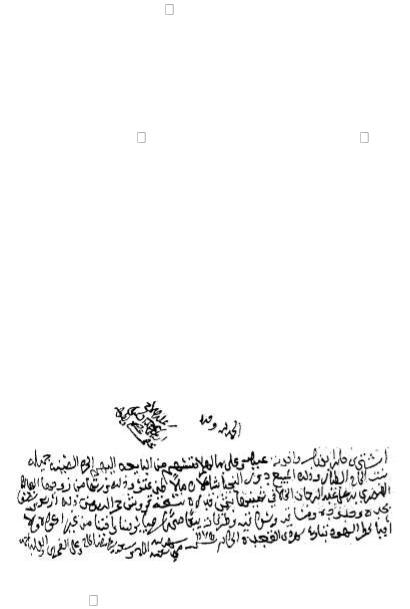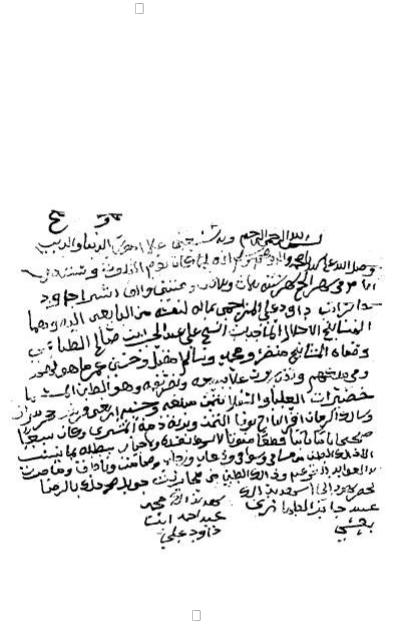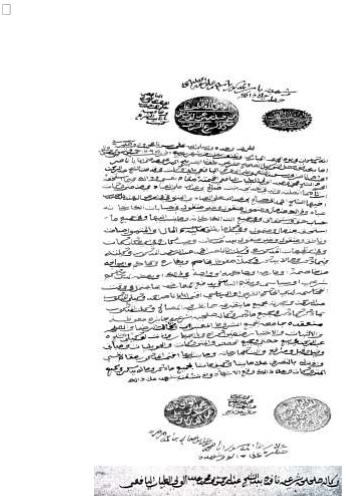
Naumkin_V_-_Islam_i_musulmane_kultura_i_politika_2008
.pdf
the month of …, in the year 1178 [AD 1764–1765], in presence of witnesses.
Witnessed |
Witnessed |
Witnessed |
‘Abdallāh amad |
Ğābir b. Muh ammad |
‘Alī Nās ir b. |
b. Ğābir |
‘Alī |
Ğābir |
|
Terminological comment |
|
E |
|
|
Esteemed, honourable – al-sadr al-ağall al-mu taram – is an epithet commonly used in documents.
‘Atar – non-irrigated land. To denote various kinds of plots distinguished as to location, fertility, water provision, etc., many designations exist in Yāfi‘.
abl is literally ‘string’ and in the mountain areas of Yāfi‘ a linear measurement equal to 60 cubits. Clarifications given by the informants concerning the value of this measure as applied to area are contradict o- ry. Most probably, a square habl is a square with a side of roughly 5.24 m, i. e. 27.4 sq. m. (3.65 abls is equal to one-hundredth of a hectare).
Qirsh hajar is literally ‘stone qirsh’, or ‘hard qirsh’. This is the way the Yāfi‘ people designate the silver Maria-Theresia dollars which were in circulation throughout South Arabia. The silver thaler was ori g- inally brought to Arabia by Dutch traders. The image of the Austrian empress Maria-Theresia (1717–1780) began to be stamped on the coin from 1780. From 1857 the thaler contained 16.67 grams of silver.
Comment
This document on the sale of a small plot of land to two brothers is of interest due to the fact that the buyers pay only a half the cost of the land at the conclusion of the bargain. Although it is not known exactly what the quality of ‘atar land is, it may be assumed that this is either undeveloped or poorly developed land, since the second part of its price will probably be paid after the former owner ensures its cultivation. In fact, it may be the question of hiring from the former owner. This hypothesis is supported by Document No 2 in which the sale is negotiated on similar terms.
234

Document No 2
Glory to Allah alone!
235

The most esteemed and honourable Ğābir Abū Nās ir and his brothers ‘Abdallāh and ‘Alī have purchased for themselves what ‘Ubayd al-Nās ir sold them – a land measuring a quarter of a abl, uncultivated, located in a place of al-‘Arīf. The land is in the ownership of the buyers, as well as what it contains of masāq and sāq , a‘ bār and arsāl, and what appertains to it of the living and the dead…[?], and the far-off deep well, as is proper according to ancient custom (‘ādah) at a price of six hard qurūsh. Half of these – that is, three hard qurūsh – [are paid] to the seller and three others – for the cultivation of all the land… [?] And this is right, and the price was fixed by the seller… [?] in presence of witnesses… on [?] day in the month of Sha‘bān, in the year 1173 [AD March-April 1760].
Witnessed by |
Witnessed by |
Witnessed by |
Thābit Du‘ās |
Mu ammad al-Hağğ |
‘Alī Qā’id ‘Abd |
|
Mushaffa‘ |
al-Walī |
And also by Sa‘īd Abū ‘Alī Salā , aydar…( illegible). In the left upper corner there is a seal, a signature of al-Wāthiq bi-Allāh ‘Alī al-Hağğ A mad alThaklī and a signature (not legible) of the person who drew up the document.
Terminological comment
A land measuring… – here turāb al-maw i‘…, where maw i‘, literally ‘place’, possibly has a meaning of ‘undeveloped, waste land’, but may also simply indicate the size of the land.
Masāq , sing. masqā(n) – small irrigation ditches, canals.
Sāq – an erroneous spelling of sawāq , sing. sāqiyah – large irrigation ditches, arterial canals.
A‘bār, arsāl – canals, connecting canals (?)
The living and the dead (here: ayy wa-mayyit) – probably livestock and inanimate objects.
Comment
In this case three brothers are buying a small plot of undeveloped(?) land along with irrigation facilities, wells and implements (most likely, no livestock are involved and this is just an obligatory formula, of which there are many examples in such documents). Half of the price, as in Document No 1, will be paid to the former owner for cultivation of the land.
From Documents Nos 1 and 2 drawn up in roughly the same time (1178 [AD 1764–1765] and 1173 [AD 1760]) we can find out the approximate price of land at that time (with allowance made for clear dependence of the seller on the buyers) – little less than one silver thaler per one sq. m.
236

Document No 3
Glory to Allah alone! |
Witnessed by al-Faqīr li-Allah |
|
Mu ammad b. A mad and |
|
‘Ali āli al-Thaklī |
The most esteemed and honourable ‘Abdallāh b. Mu ammad Sa‘īd al-Shaffa‘ purchased for himself from his sellers Mu ammad b. Sa‘īd and his brothers –‘Alī and Murshid what they own and keep, in the full understanding, in a well-known lawful manner, namely only half of
‘atar land in ‘Anab and Furrān. It belongs to the buyer with all that there is on it. As is known, that is, with all the titles for the area, for cultivation, for the stones, for the trees, for the irrigation ditches, and for the roads. The bargain is rightful and legal and takes effect immediately, while the price is set at thirty qurūsh, half of which – fifteen qurūsh – is set for payment [?] by the sellers, for receipt of the main and the supplementary, and they guarantee this. Done in the month of
Ğumādah al-‘ūlā, in the year 1161 [AD May-June 1749].
This is witnessed by – ‘Alī al- a‘ādī and others (signatures).
237

Comment
T
Comment
This document also supplements the first and the second ones. It deals with land of roughly similar type, with irrigation ditches but without a well. Here the purchasers also by arrangement pay half of the price of land at conclusion of the bargain, after which they take over the right of possession, the fate of the second part of the price, which is set by the buyers, remaining unknown. This document was drawn up earlier than the previous ones, and the price of land is here substantially higher (a abl equals 60 qurūsh compared to 24 qurūsh in Documents Nos 1 and 2), which may be explained both by fluctuations in the land price and in its varied quality or location.
Document No 4
|
Qādī |
|
Glory to Allah alone! |
A mad ‘Alī |
ālih |
238

al-Thaklī
Honourable ‘Alī Abū Nās ir purchased from his seller āli ‘Alī b. ‘Alī ‘Abdallāh Naqīb, having earlier paid half of the price, half of the price being 18 [qurūsh], what he had of masāq , sawāq and roads.This sale was accomplished when the price was negotiated in presence of witnesses on Thursday, in the month of Sha‘bān, in the year 1178 [AD
January-February 1764]. |
|
|
Witnessed by |
Witnessed by |
Witnessed by |
Ğābir b. Ğābir |
Muh ammad Sa‘īd |
‘Abdallāh Nās ir |
Comment
This document seems incomprehensible, as it does not mention land: the buyer pays eighteen qurūsh for irrigation facilities which, naturally, cannot be sold separately from the land. Most likely, the land had earlier been mortgaged to the purchaser for eighteen qurūsh, that is why its dimensions and location are not mentioned here (see the fourth type of document – mortgage deeds), and now its transfer to the lender is finally legalized by the sale of irrigation facilities.
Document No 5
Glory to Allah alone!
āmid b. Nās ir and his brothers ‘Abdallāh and ‘Alī have purchased what began to belong to them from the seller, free Ğamīla, daughter of al-Hağğ alayyar. She has sold them entirely and completely the ‘atar land. She inherited it from her perished husband ‘Alī ‘Abd al-Ra man alhilāfī and valued it at nine hard qurūsh… [?], and this with all its borders, sawāq and roads. The sale was rightful, legal, in full satisfaction and without duress or violence.
239

Executed in the month of Dhū al-Qa‘dah, in the year 1175[AD June 1762], in presence of witnesses al-Hağğ Mu ammad Sa‘īd, Sa‘īd ‘Abd al-Hağğ and ‘Alī al-Ghamrī. And glory to God.
Terminological comment
Free – alurrah al-s ayyinah, it means that this woman doesn’t have husband (not married, or divorced).
Comment
In this case we are dealing with a sale by a widow of a plot of land (possibly uncultivated by her), which she inherited from her deceased husband. On evidence from informants, land from widows and women generally was often bought up by fellow tribesmen without the wish of these widows and women, sometimes even in absentia.
Document No 6
In the name of Allah, Merciful and Compassionate! To Him we appeal in the affairs of this world and faith, and let Allah bestow His blessing and bliss to our lord Muh ammad and Mu ammad’s family!
On Thursday of the third day of the month of Dhu al-Hiğğah 1233[AD 15 October 1814], Dāwūd Ğābir b. Dāwūd ‘Alī al-Mu āğimī
240

bought for his money from his sellers, free shaikhs (mashāyi h) al-Māğīd b. al-Shaykh ‘Alī ‘Abd alayy b. āli alibā and his brothers shaikhs Munas s ar, Mu ammad, Sālim Muqbil and usayn ‘Umar what belonged to them and what they possessed and disposed of and could sell, namely a plot of land called hu ayrāt al-‘Ulyā, a carpet and a ğanbiyyah for forty hard qurūsh and sirāt (tobacco). The bargain was executed without objection from the parties thereto, was rightful, satisfactory and voluntary, without duress and violence, by their demand, with all that appertains to that plot of land, namely: water, sawāq , ash‘ab, u āb, animate and inanimate, and all for due deductions. And that land in ma ār th (Ğubād?) ğul Badrīya. And this is certified in presence of wit-
nesses. |
|
Attested by |
|
‘Ubayd Ğābir al- |
al [?] Ğa ī Mu ammad ‘Ubayd |
Ba‘āshī |
A mad b. Dāwūd ‘Alī |
|
Terminological comment |
A plot of land – t |
n. |
hu ayrāt al-‘Ulyā is the name of the plot, literally ‘green upper [lands]’.
Carpet – here: silqah, a wowen carpet or a mat which is spread out in drawing-rooms to sit upon.
Ğanbiyyah is a dagger, the Yemeni national arm. Among the tribes it was considered an obligatory accessory of men’s costume. The ğanbiyyah’s sheath was, as a rule, made of silver.
Sirāt is a local sort of tobacco.
Ash‘āb means mountain slopes down which water streams towards terraced plots of land in the rainy season.
uhāb = animate and inanimate. In this case s āmit wa nāt iq, i. e. implements and cattle.
Mah āri th (literally: tilled lands) denotes the borders of cultivated plots of land.
Ğūl means large, richly irrigated flat places in the mountains where, as a rule, terraces are made.
Comment
In this case a man nicknamed al-Mu āğimī (not legible) buys from four brothers belonging to the clan of shaykh ‘Alī (members of this clan were among the Yāfi‘īs settled in a ramawt) the whole land with irrigation facilities, cattle (if cattle was available) and implements, a carpet and
241

a dagger in exchange for money and tobacco. The oddity of this set may be explained, for instance, by the fact that the brothers were leaving Yāfi‘.
The second kind of document is the document on the transfer of rights of disposal, ownership, sale of property, a sort of unlimited powe*r of attorney with the right to sell property. This deal is called wi ālah or taw l and the person who received a wi ālah document wa l. By way of example we shall cite the text of a document obtained in a family living in the vicinity of Lab‘ūs (possibly from the tribe of Had ramī).
Document No 7
Glory to Allah alone, and let Allah’s blessing and grace rest upon our lord Muhammad, his family and cohorts!
On the blessed Friday of the thirteenth day of the month of ar-Rabī‘ al-ākhar, in the year 1295 [AD 26 April 1879], a rightful legal taw l
242

took place, which sincerely, rightly and in a satisfactory manner was performed by me, the undersigned Bā Nā ir b. A mad Nas ir b. Sa‘īd, from the inhabitants of al- a ramī al-Yāfi‘ī. I entrust Shaikh ‘Abd al-Ra mān, son of Shaikh Mu ammad b. ‘Abd al-Walī alayyār al-Yāfi‘ī to substitute me in my place in all I own in the inheritance received by my mother
hadīğah Bint Sāli b. ‘Abdallāh ‘Alī al-‘Abbādī, from the matrū āt of her brother Shaikh A mad b. alā b. ‘Abdallāh ‘Alī al-‘Abbādī deceased in the land of India, let Allah pardon his slaves, that is, from the money, movable and immovable property, accurate calculations of haqq and istihqāq, all the instruments of āra hānah and what appertains to them, all the money and what it is invested in and called māl and mutamawwil, speaking and non-speaking, movable and immovable, in whoever hands it was found and wherever, in whatsoever place it was, in any country of those mentioned. I, Bā Nās ir Ah mad, entrust the aforementioned ‘Abd al-Rah māan to be my plenipotentiary wa l in everything I enumerated and failed to enumerate, to be at enmity, litigate with and oppose any person who will be at enmity or litigate with him in the shar ‘ah court or in front of a political ruler. I, Bā Nās ir Ah mad, entrust my aforementioned wa l to make use of all that is assigned to him depending on what the interests may be, I trust him with all I mentioned and in the way I mentioned, and this is executed by a rightful legal taw l, at will and with compensation, fully and in compliance with all the terms and considerations, firmly and voluntarily, without duress and violence. I entrust my wa l Shaikh ‘Abd al-Rah mān to sell my share and all shares, matrū āt, lands, buildings, horses and sources of water, implements, the instruments of āra hānah and what appertains to them, I authorise the aforementioned person to deputise for me in my place and allow him to dispose of everything as he pleases, all things mentioned and unmentioned, all matrū āt. This testimony is hereby signed and
Witnessed by |
Witnessed by |
|
al-Wāthiq bi-Allāh Nas r Muh ammad |
al-Wāthiq bi-Allāh |
|
b. ‘Alī b. S ālih b. A mad b. |
Mu |
ammad b. ‘Alī |
al-Shaykh ‘Alī Hirhira |
aydar b. ‘Alī |
|
25 Shawwāl, 1275 [AD 8 June 1859] |
‘I |
al-Dīn |
(personal signature) |
(personal signature) |
|
(Beside the seals stand the witnesses’ signatures). In the upper section of the document there are personal seals of two more witnesses; their signatures are beside them:
- Shaykh Al-Wāthiq bi-Allāh Bā Sallām b. ‘Alī alabbāghī
243
